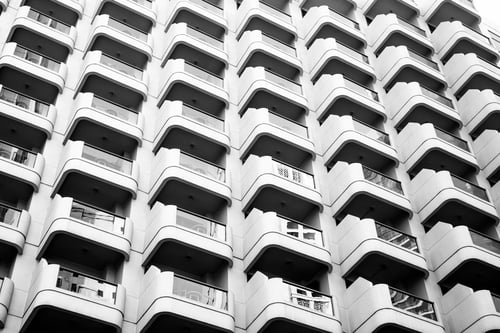When buying a condo or an individual property within a residential community, you’ll need to join and contribute to the HomeOwners’ Association (HOA). The HOA exists to ensure all shared amenities are looked after and all homeowners contribute to the maintenance of the whole property, not just the condo they buy.
In this article, we delve deeper into the question 'what does a Homeowners’ Association do?', including what they are and the different rules you’ll need to comply with if you join one yourself.
- What Is a Homeowners’ Association?
- What Does a HomeOwners' Association Do?
- What Are the Rules of a HomeOwners’ Association & Do They Apply to You?
What Is a HomeOwners’ Association?
A HomeOwners’ Association: The Basics
An HOA is an organization within a housing complex or building that collects funds, controls budgets and affects the repairs and maintenance of the common parts of the property, as well as establishing and applying community rules to uphold the standard of that property on behalf of its owners.
Anyone who owns a property is automatically a member and must pay monthly or quarterly fees.
We often find that condo buyers are surprised by the HOA fees they’ll have to pay once they own the property. For many, it isn’t something they’ve come across before and it can be frustrating when yet another bill needs paying.
HOA fees vary depending on the building or community your property is a part of. The more upscale the property and the more amenities available to residents, the higher the fees.
Why Do HOAs Exist and How Do They Work?
As everyone lives within the same complex, all residents should be equally responsible for the upkeep of communal areas and facilities. Residents pay a fee each month or quarter and the money collected goes towards maintaining everything from the landscaping and sidewalks to security gates and the building’s exterior.
You’ll be required to pay fees that cover the maintenance and repair of communal facilities and amenities. As all homeowners pay into the HOA, reserve funds will accumulate over time. These funds are used to pay for any extra expenses that might be needed, like a roof repair or adding a new elevator to the building.
From time to time, the HOA might issue special assessments if they have insufficient funds to carry out a significant project and need to request more money from homeowners. For example, repairing the roof, or updating a site-wide security system.
If owners fall behind on monthly payments or refuse to pay extra costs, they could be given a legal document called a lien, which guarantees they’ll repay the debt. This protects all other property owners and ensures the property is well-maintained.
Although it’s another cost to think about, it’s clear the HOA is for the entire community’s benefit. The HOA’s work improves the quality of life for all residents and helps protect and enhance property asset value. Happy residents make the complex an excellent place to live and a well-maintained building covers property prices if you eventually want to sell.
But to receive the benefits of the HOA, you also need to comply with its rules and regulations.
Homeowners’ Associations: The Rules
HOA structures vary from development to development. Usually, there’s a management team comprised of representatives from the owners and the developer or management company.
Together, they control the HOA and ensure the HOA’s rules and regulations are applied across all owners. If a homeowner consistently breaks the rules, they can be given extra fees to pay, be forced to comply or even have to deal with legal repercussions.
The HOA you’re a part of will set out covenants, conditions and restrictions you’ll need to follow. Depending on the development you live in, these rules could cover the color of your door, whether or not you’re allowed pets and even if you’re allowed to hang laundry outside to dry.
To do anything outside what the HOA permits, you’ll need to apply for a variance. You’ll have to convince the HOA and the majority of other owners that what you want to do is acceptable. Due to this, it’s essential you research the HOAs rules before committing to purchasing a condo. You don’t want to sign a contract only to find the complex doesn’t allow pets, for instance.
For some, the rules and regulations are a minor inconvenience, but others dislike the idea of being told what to do on a property they own. Meet with the HOA president to get a feel of the Board. You’ll probably find them to be reasonable, and understanding and they’ll likely have been living in the building for several years. This makes them a great source of information for any questions you might have.
You’ll probably find you have a balanced relationship with an HOA. They stop your neighbors from owning 20 cats, but they might expect you to carry out maintenance on your property that you’d rather put off.
What Does a HomeOwners' Association Do?
Homeowners’ Associations are essential in condominium developments or apartment buildings, where a property is split into several dwellings and ownerships. In some cases, individual owners of these dwellings also own the common areas. In other cases, for example, in a resort condominium where there’s a hotel, the landowner or hotel retains the ownership of the amenities.
HOAs are a crucial part of condo ownership, so let’s explore exactly what a HomeOwners’ Association does in some more detail.
Shares the Maintenance Responsibility for the Property
One in five Americans live in a home that has an HOA, so it’s essential to understand exactly what HOAs do. In a condominium development or apartment building, everyone lives within the curtilage of the property and shares common space. So, it’s only right for everybody to share the responsibility of the upkeep of the common areas and facilities.
As time goes on, the cost of maintaining them increases. You’ll be required to pay fees that cover the maintenance and repair of communal amenities and facilities such as a pool or gym.
As all homeowners pay into the HOA, reserve funds will accrue over time which can be used to pay for any extra expenses needed. However, it won’t be the owners’ responsibility to carry out the work. That job generally falls to the management company, with the HOA helping to specify works and then coordinating funds and payment on behalf of owners.
Owners can then just enjoy their home knowing it is in good hands. The same applies to vacation condos, where knowing your property is cared for while you are away is even more critical.
Ensures Major Projects Are Completed
As time goes on, the HOA might issue special assessments if they have insufficient funds to carry out a major project. This could be something that can potentially add value to the entire property and benefit everybody involved.
HOA committees are invariably represented by a mixture of condo owners and other significant stakeholders. These committees then strive to protect all other property owners and ensure the property as a whole is well-maintained. Who better to run a community than the people living in it? Or those directly involved in its operation — as opposed to a landlord you’ll never see.
If you own property in a hotel condominium, your HOA fee could be covered by rental income from guests staying when you’re not in residence. Sometimes, property costs can also be tax-deductible as a rental expense.
Protects and Enhances Property Asset Value
Although HOA laws can sometimes seem strict, they are there to protect property values and owners’ interests. It might seem like just another cost to think about, but clearly, the HOA is for the benefit of the entire community.
The work the HOA does improves the quality of life for all residents and helps to protect property asset value. This makes the condominium development, apartment building, or resort a good place to live and a well-maintained property is vital if you eventually want to sell.
But for you to receive all the benefits and support of an HOA, you also need to comply with its rules and regulations.
What Are the Rules of a HomeOwners’ Association & Do They Apply to You?
What Are Some Commonly Enforced Rules?
Every HOA is different and should have clearly outlined policies. However, here are some key points to note and some of the more common rules that many HOAs apply:
- Before committing to a condo, you should research their association and determine precisely how much you’ll need to pay and what the fees will cover. Your real estate agent should assist you in finding out all of the rules and regulations for the association, along with other important considerations.
- The HOA has a responsibility to ensure the community looks a certain way, which means they’ll have rules concerning landscaping. Some of the rules will be obvious, like keeping your laundry inside your condo, but you might find some obscure ones too.
- An essential HOA rule you need to know is the policy on rentals. Unfortunately, not every HOA will allow you to rent out your property, especially short term. You'll want to verify the rules concerning rentals to avoid expensive fines and disappointment, particularly if you are depending on rental income to contribute towards annual property costs. It’s also worth noting that some condo resorts actively promote rentals.
- For many of us, pets are an essential part of our family and many HOAs have rules concerning them. So before you buy or rent a condo, it’s wise to check if your four-legged friend will be allowed.
- There will likely be rules about waste, such as limits on what can go in the garbage or when you can take out or bring back your trash cans.
- HOAs often have strict rules about holiday decorations and how elaborate or large they can be. They may also have restrictions on when you can put your holiday decorations up and when you have to take them down.
- Almost all HOAs have rules requiring you to keep your home’s design similar to the other homes in the community. That means you’ll probably break the rules if you paint your home a different color, and add an awning or patio furniture that doesn’t match. It may be possible to make small design changes to the home, but you’ll most likely need to get written approval from the HOA first. Condos in hotel condominiums generally have matching interiors for hotel marketing purposes, so there will be little flexibility for this type of property.
- It’s no surprise many HOAs will have rules concerning noise. They’ll often have hours when an amount of noise is allowed and defined hours when antisocial noise isn’t permitted. This is for the benefit of everybody living in the property or resort.
The rules are there to make sure the resort is a pleasant place to call home, but does everybody have to abide?
Do HOA Rules Apply to You?
If you own property in a hotel condominium, your annual rental income will contribute towards the HOA fee. Sometimes, property costs can be tax-deductible as a rental expense. Keep in mind that the HOA rules are legally binding and you agree to abide when you sign your membership and ownership documentation.
It’s crucial to know how HOA’s work alongside condo owners, particularly in a hotel condominium model. That's why we’ve created a resource that includes the finer details.
Explore More About HOA and hotel condominium Ownership
You shouldn't avoid HOAs as they benefit everybody involved in a condominium property or resort. That’s why we’ve created a visual guide outlining everything you need to know about owning a condo in a hotel condominium resort. From HOA details to how the hotel condominium model weighs up against fractional ownership or renting out your vacation home yourself — it’s accessible and easy to read.
This resource shows how hotel condominiums make vacation home ownership a breeze. From their relationship with prestigious hospitality giants like Hilton to how they can make excellent rental properties, click below to get access and start your journey.






